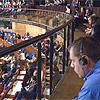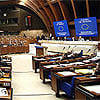A day of reckoning for Europe |
For more than 50 years, protecting human rights and promoting democracy
have been core missions of the Council of Europe. But how well are
the Organisation’s member states living up to their commitments
in these vital areas?

Despite efforts to improve human rights, people in Europe
continue to be subject to extra-judicial killings, tortured or disappear
without trace, trafficked for sexual exploitation, abused because of
their gender, ethnicity or religion and discriminated against by the
state.
And what about democracy, once celebrated as Europe’s
gift to the world? Political freedoms are dwindling in some countries
as subtle new threats to transparency and accountability emerge, while
in others distrust and indifference undermine democratic institutions.
But the Council of Europe is not there only to point
out problems: through its various monitoring mechanisms – including
the Assembly’s own country-specific monitoring – it helps
states to live up to their promises to their peoples to fully abide by
European democratic and human rights standards.
On Wednesday 18 April 2007, in a new initiative supported
by PACE President René van der Linden, Greater Europe’s
parliamentarians joined with leading figures from the global human rights
community – the UN High Commissioner for Human Rights, Amnesty
International and Human Rights Watch – as well as the heads of
the main Council of Europe monitoring mechanisms for an unprecedented debate on the question: what is the state of human rights and
democracy in Europe today?
The reports
|
The
state of human rights in Europe
 Part I of a joint report, prepared by the Legal Affairs Committee Part I of a joint report, prepared by the Legal Affairs Committee
Rapporteur: Christos Pourgourides (Cyprus,
EPP/CD)
The Legal Affairs Committee, in its part of a joint
report, argues that there is a growing gap between solemn
declarations on human rights and the reality on the ground. “It
is time to end hypocrisy and turn words into deeds,” the
committee declares, calling for “zero tolerance” of
human rights violations.
|
The
state of democracy in Europe
 Part
II of a joint report, prepared the Political Affairs Committee Part
II of a joint report, prepared the Political Affairs Committee
Rapporteur: Andreas Gross (Switzerland,
SOC)
The Political Affairs Committee, in its part of a joint report, says there has
been unquestionable progress in advancing democratic standards but there are
growing deficits too, leading to disaffection among citizens. Its key recommendations
include enlarging the right to vote, greater representation for women, more “direct
democracy”, and steps to promote civic education. |
Progress
of the Assembly’s monitoring procedure
 Report
of the Monitoring Committee Report
of the Monitoring Committee
Rapporteur: Eduard Lintner (Germany,
EPP/CD)
In its annual report, the Monitoring Committee says progress has been made in
all 13 countries under a monitoring or post-monitoring procedure, but also points
to “setbacks” and lists problem areas. It also makes recommendations
to the 11 non-monitored states subject to this year’s cycle of periodic
reports (Greece, Hungary, Iceland, Ireland, Italy, Latvia, Liechtenstein, Lithuania,
Luxembourg, Malta and the Netherlands). |
|
Special preview event:
On the eve of the debate, PACE President René van
der Linden answers your questions in a live video blog
(5-6 p.m. French time on Monday 16 April). |
| |
Other side events:
* PACE sub-committee public hearing on democratisation
in Belarus, with opposition leaders (Tuesday, 6pm)
-----
* Human Rights Commissioner’s round table on human rights
challenges and opportunities in Europe (Tuesday, 2pm, restricted)
-----
* NGO round table on democracy and human rights in Belarus
(Monday, 5.15pm) |
|
|
The Assembly’s other committees have also prepared
opinions on the above reports:
The speakers
Special guests from the global human rights community:
Speakers from the Council of Europe:
|
|


 Part I of a joint report, prepared by the Legal Affairs Committee
Part I of a joint report, prepared by the Legal Affairs Committee Part
II of a joint report, prepared the Political Affairs Committee
Part
II of a joint report, prepared the Political Affairs Committee Report
of the Monitoring Committee
Report
of the Monitoring Committee